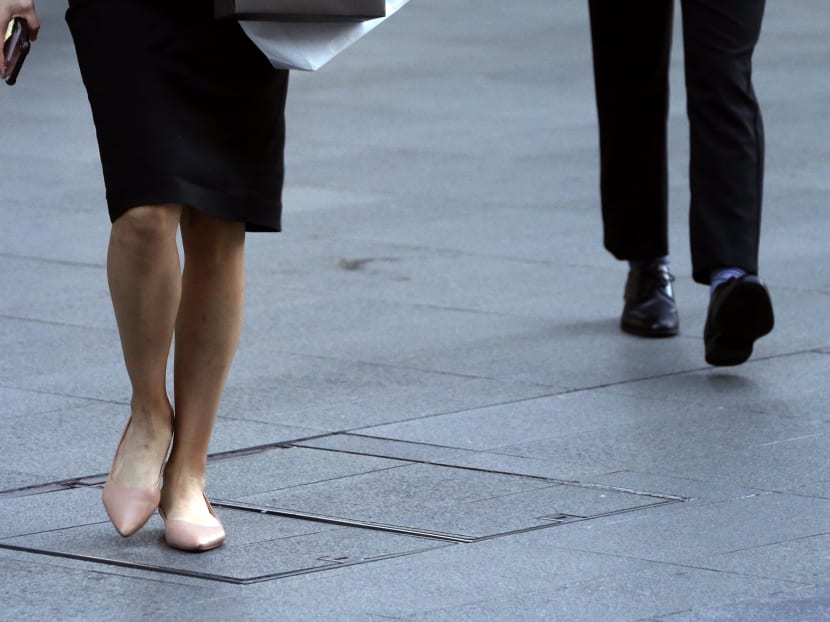Men need to step up and be part of conversations on gender equality: Shanmugam
SINGAPORE — More men need to be advocates for gender equality, but the Government has been facing some challenges getting more of them on board, Law and Home Affairs Minister K Shanmugam said on Thursday (June 3).

Law and Home Affairs Minister K Shanmugam (pictured) said that in dialogue sessions on women's issues held by the Government, 75 per cent of the people taking part were women and 25 per cent were men.
- Men make up just a quarter of participants at dialogue sessions on women’s issues organised by the Government, Mr Shanmugam said
- Gender equality is not simply a women’s issue, but a societal issue, he added
- The dialogue sessions will contribute towards a White Paper on gender equality
SINGAPORE — More men need to be advocates for gender equality, but the Government has been facing some challenges getting more of them on board, Law and Home Affairs Minister K Shanmugam said on Thursday (June 3).
In an online discussion on women’s issues organised by the Institute of Policy Studies, a think tank under the National University of Singapore, Mr Shanmugam revealed that men make up only 25 per cent of participants in dialogue sessions on women’s issues that the Government has been organising.
“It is not a women’s issue, it is a societal issue. Every man has a serious role. How do you get them to come on, if you have ideas, please tell us,” Mr Shanmugam said in response to a question by Professor Lily Kong, president of the Singapore Management University, who was the moderator of the discussion.
She had asked what can be done to get men to jointly advocate for women’s equality.
Mr Shanmugam added: “In the conversations that we have been having, we’ve tried to get men on board. It’s been encouraging. But I’ll be frank, 75 per cent were women, 25 per cent were men. And we need to change that balance to 50-50. We need to get more men into it.”
He was referring to dialogue sessions the Government’s feedback arm Reach has been organising to understand the issues that women in Singapore often face.
The sessions are part of an undertaking by the Government to review issues affecting women in Singapore through a series of dialogues, which began in September last year.
This review, called the “Conversations on Singapore Women’s Development”, will collate feedback and recommendations, which will culminate in a White Paper that will be delivered in Parliament some time this year.
Kicking off this review in September last year, Mr Shanmugam said then that the purpose of this initiative is to shift the Singaporean culture and mindset on gender equality and respect for women.
On Thursday, while he said that both male and female senior civil servants and Cabinet ministers believe that this is an important issue, more can be done to increase men’s participation in this review.
Ms He Tingru, Member of Parliament for Sengkang Group Representation Constituency, who was the other panellist in the online discussion, said that it is worth finding out the reasons for the low participation rate of males.
Besides the role men play in the push for gender equality, Mr Shanmugam and Ms He also discussed several other issues in the discussion that lasted for about 90 minutes.
Ms He advocated for the need to have anti-discrimination legislations, especially in workplaces.
She said that pregnant women do get comments from employers who say they cannot promote them because they are stopping work for a few months during their maternity leave.
“Having an anti-discrimination legislation to mandate that employers have a structure in place to protect women, I think that is something that is long overdue and we should seriously look into that,” she said.
While Mr Shanmugam said that he does not rule out legislation, it will not solve the problem by itself, based on the experiences of other countries.
In addition to legislation, he said that a mindset change, where both men and women share the belief that it is important for women to go on their maternity leave to care for their children, is also needed.
Both Mr Shanmugam and Ms He also discussed the importance of recognising the sacrifices of caregivers, who are mostly women, through some monetary compensation.
Ms He said that many unpaid caregivers end up not having enough to retire because they often give up their careers to take care of their family members who are ill.
Mr Shanmugam said that he does not want to cheapen their sacrifices by linking it to money, but the Government is looking at how their contributions can be recognised financially.
They also discussed whether there should be quotas to get more women representation on boards of companies, how parental leave should be implemented and the role the media plays in reinforcing gender stereotypes.








